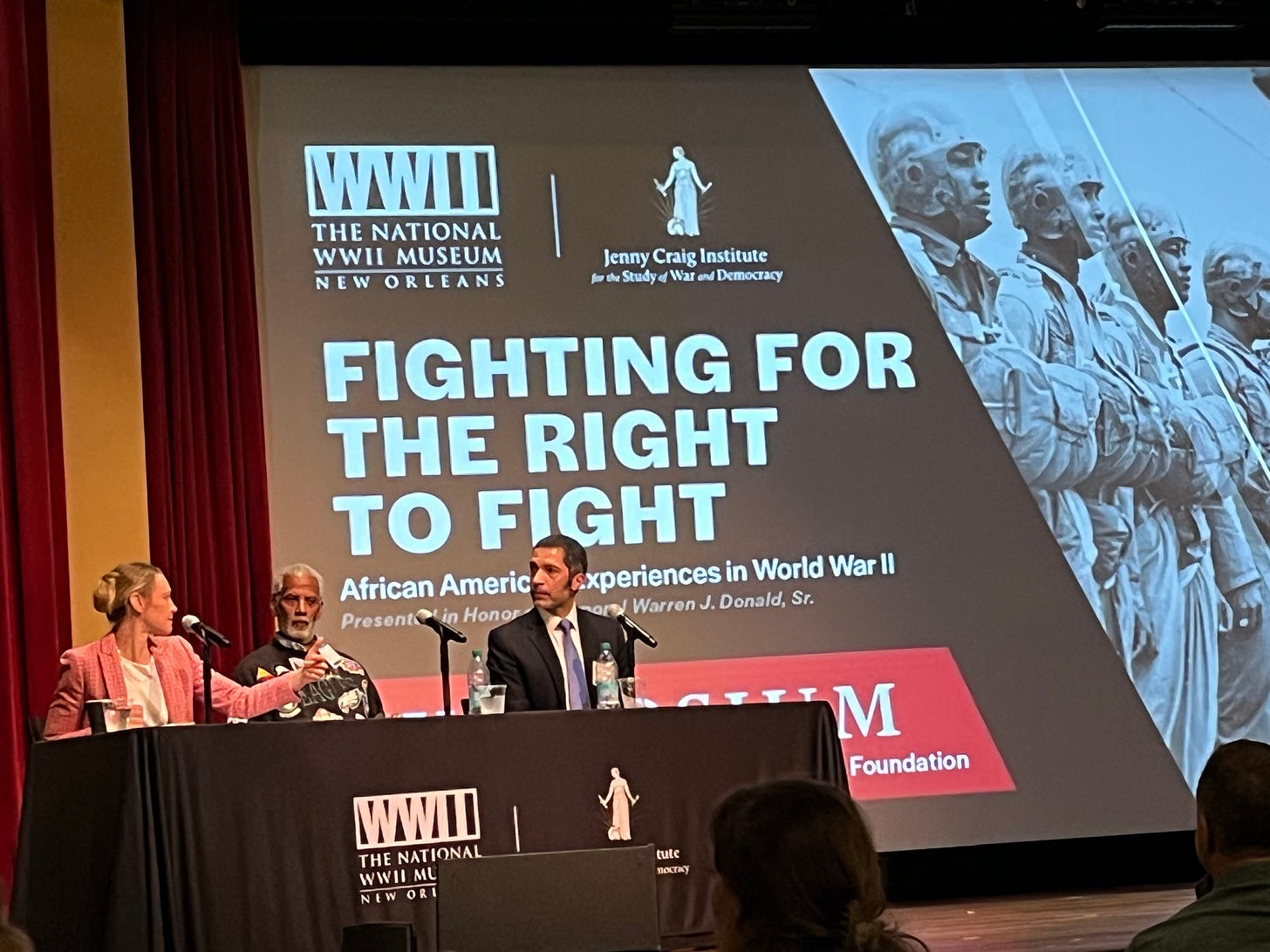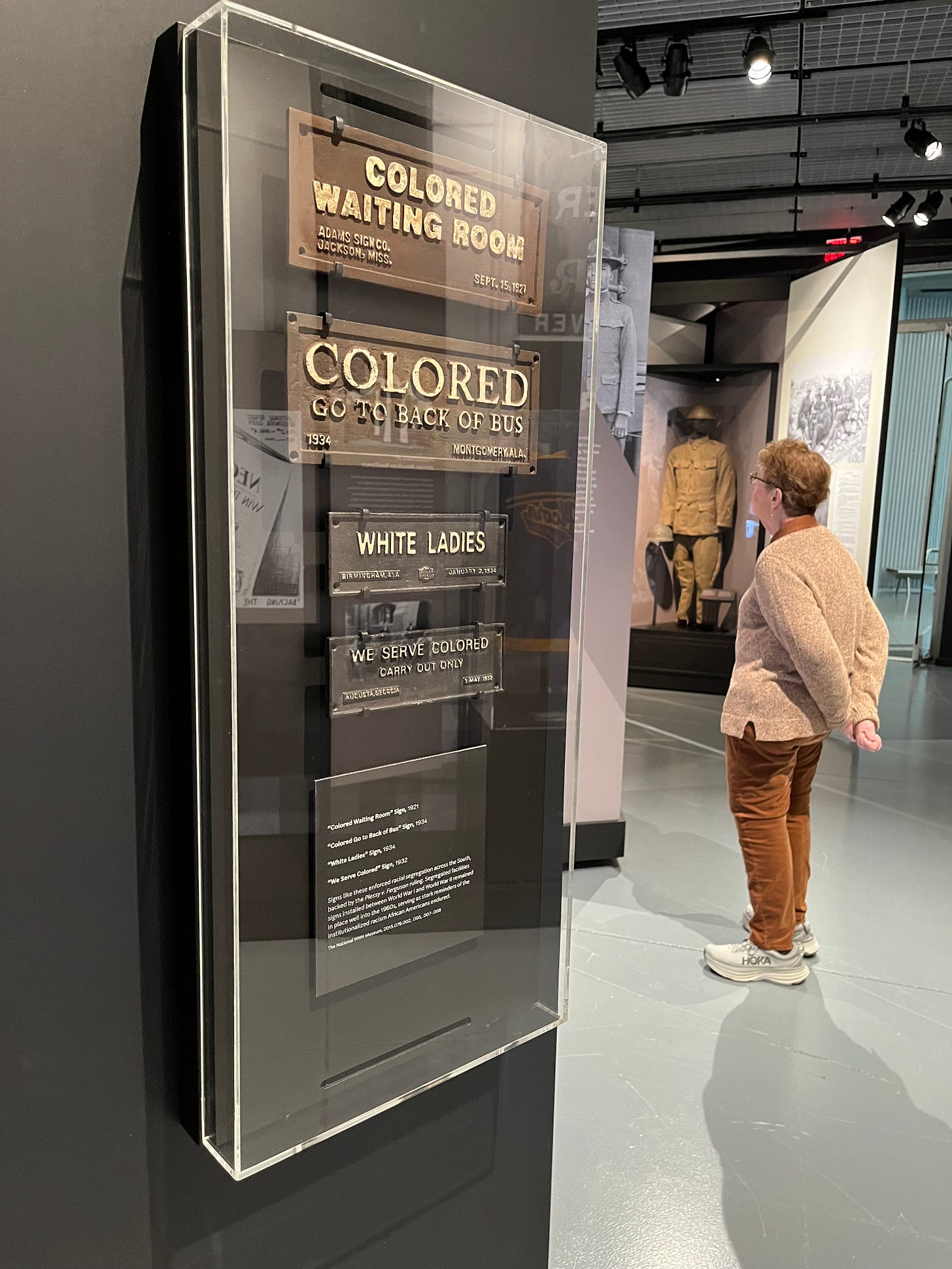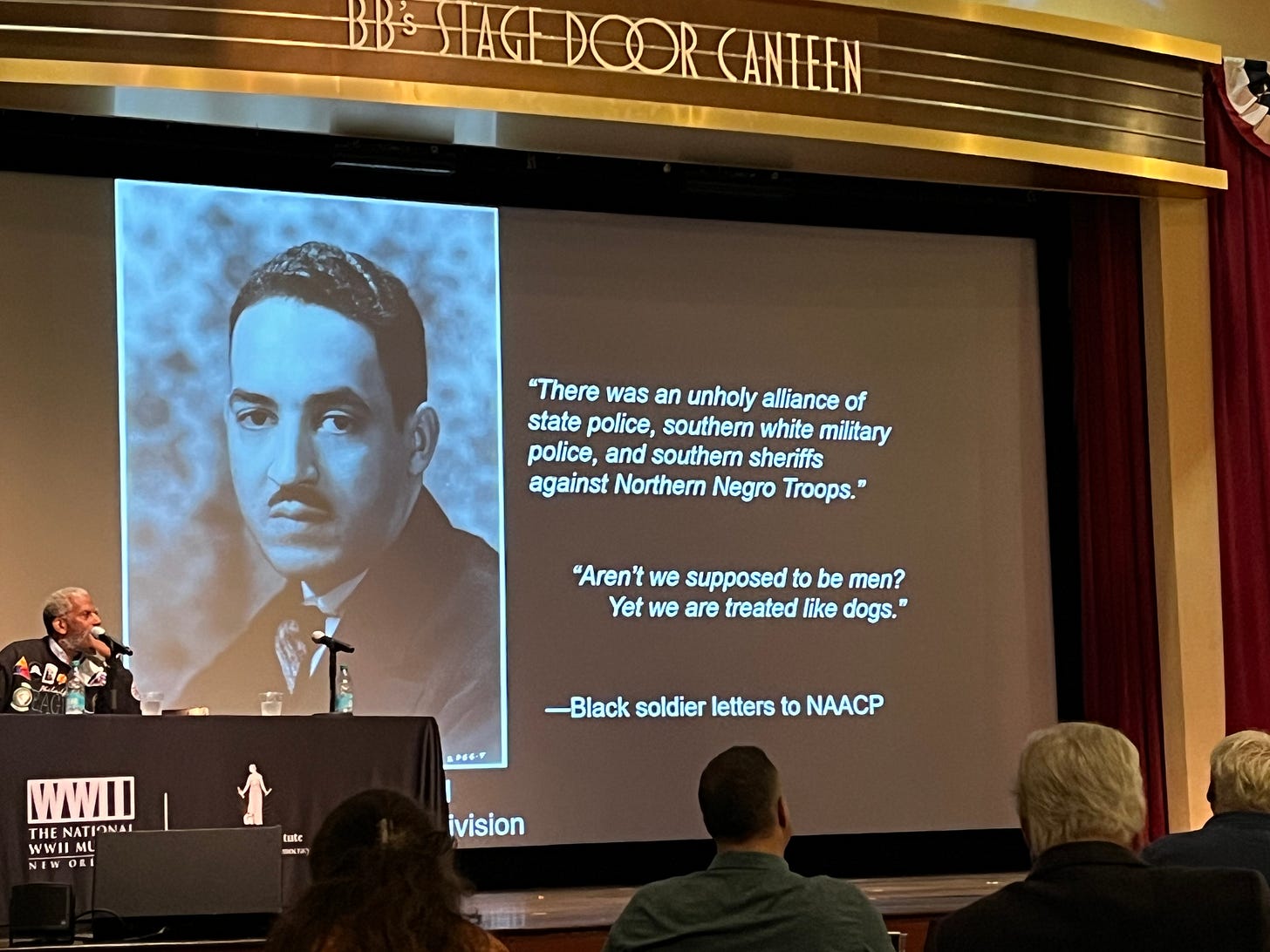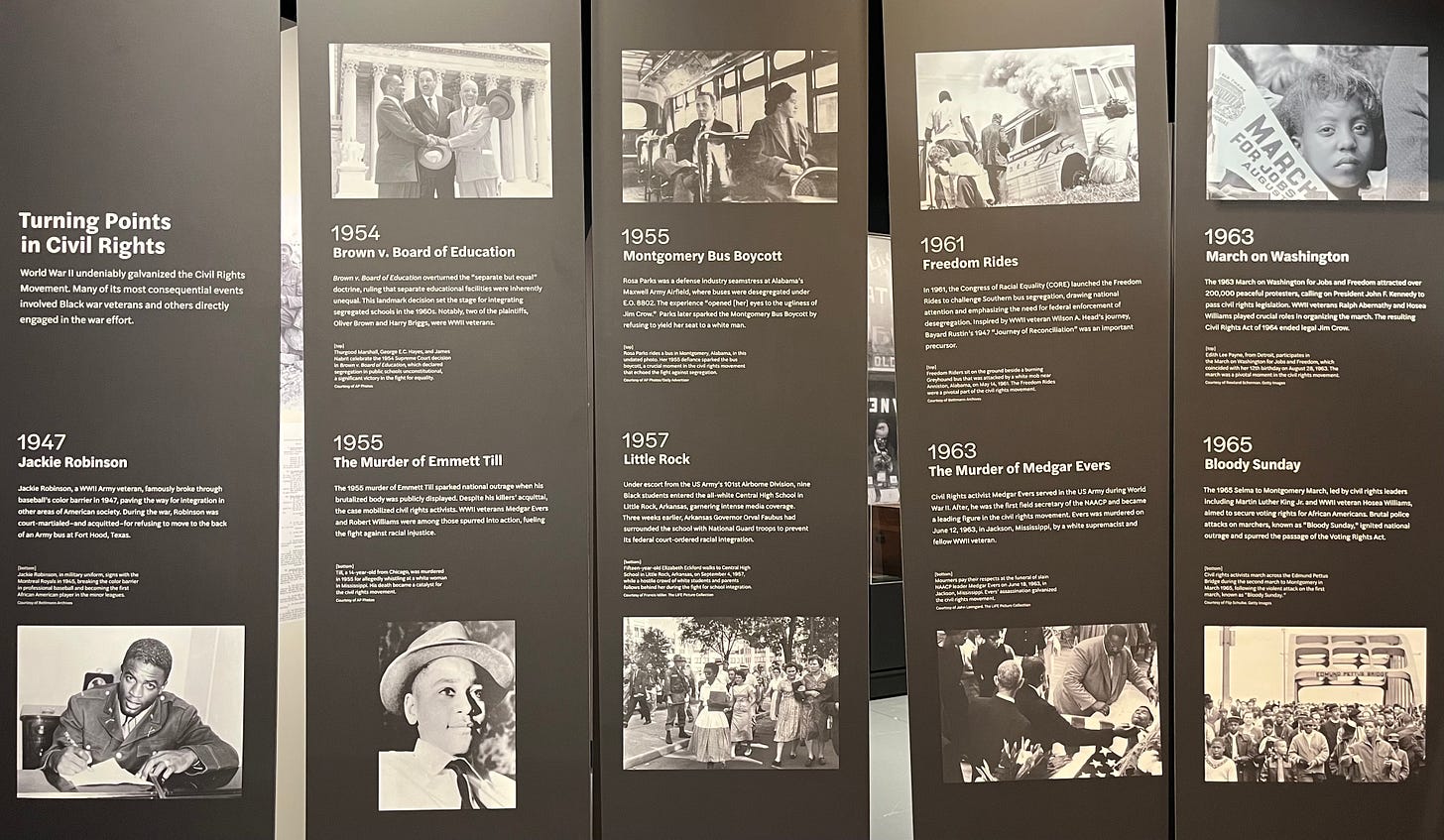Black soldiers were fighting 2 wars during World War II
Oscar-nominated short `A Lien' gives perspective on enforcing immigration
Please consider supporting The Front Page with a paid subscription: HERE
Slide by Powerpoint slide the emotions built over the course of an hour.
Gregory Cooke, a documentary filmmaker, was the speaker of the moment showing a side of the World War II home front too many of us simply did not know about.
In his film, Invisible Warriors: African-American women in World War II, Cooke showed us of the 600,000 African-American women who were also "Rosie the Riveters" during World War II.
Cooke quietly told the story of a young Rosa Parks working as a defense industry seamstress at Alabama's Maxwell Army Airfield. She sat anywhere she wanted on the base's desegregated buses, but when she got to the Montgomery city limits, she had to go to the back of the bus.
It was a reminder of the opportunities African-American men and women received during World War II that proved to be a significant building block for during the Civil Rights movement in the 1950s and 1960s.

The audience was reminded of that repeatedly during Saturday's symposium "Fighting for the Right to Fight."
It was reminded it took a special commission 50 years after the war to get Medal of Honor recognition for seven African-American soldiers.
"There is just too much making up after the fact," Cooke said in frustration.
When the "race riots" after World War I were brought up, he shot back, "They weren't race riots, they were race massacres."
Cooke finally looked around the room at the National World War II Museum and said, "This research can make you angry."
This is Black History Month and what we learn each year is often more ugly than inspirational.
Stephen Ambrose, the author and historian who played a significant role in founding World War II Museum, reminded us in his 1997 book Citizens Soldiers, "The world's greatest democracy fought the world's greatest racist with a segregated army."
It is a journey researchers like Cooke, who was an advisor on theexhibit at the museum, have found painful.
"Emotionally, it is like having my teeth drilled without Novocain," Cooke said. "I know African-Americans know what I'm talking about, but I'm not sure the rest of you do."

The exhibit chronicles how African-Americans soldiers were denied combat assignments and often given menial jobs behind the lines through two world wars until they could not be ignored any longer.
The prejudice was deep-seeded and goes back 100 years to a 1925 War College study that claimed Black soldiers were poor fighters, could not lead, and were only useful as laborers.
On display was the Oct. 30, 1925 memorandum from the Army War College Office of the Commandant titled: "The use of the Negro manpower in war."
In Part III it addressed "the problem."
- The Negro is physically qualified for combat duty.
- He is by nature subservient and believes himself to be inferior to the white man.
- He is most susceptible to the influence of crowd psychology.
- He can not control himself in the fear of danger to the extent the white man can.
- He is not the initiative and resourcefulness of the white man.
- He is mentally inferior to the white man.
That remained the military perspective for the two decades before World War II.
The experience of Black men and women before and during World War II is complicated. African-Americans who chose to enlist in the military in both world wars faced both enemy fire and racial discrimination. But as World War II advanced and casualties mounted, African-Americans were finally employed in roles beyond supply, maintenance and transportation.
"During World War II, African American soldiers faced both enemy fire and racial discrimination.," it says in the exhibit. "Initially assigned to support roles, as casualties mounted among white soldiers, the military employed African Americans as infantrymen, tankers, and pilots."
It took a long time to get there.
The exhibit describes "inferior segregated barracks, facilities and training programs and were often relegated to menial, labor-intensive tasks with substandard equipment. White officers delayed or denied them promotions and limited their recognition for achievements or valor. They received harsher punishments for minor infractions compared to white soldiers and regularly endured verbal and physical abuse from superiors and fellow soldiers, which sometimes led to violent clashes."
Charles Hamilton Houston, a highly decorated artillery officer during World War I, is highlighted in the exhibit with his account of his military experience.
"The hate and scorn showered on us Negro officers...convinced me that there was no sense in my dying for a world ruled by them."
During the war, Black soldiers sent letters of complaint to the NAACP.
"There was an unholy alliance of state police, southern white military police, and southern sheriffs against Northern Negro Troops," wrote one Black soldier. "Aren't we supposed to be men? Yet we are treated like dogs."
Another wrote, "I am a Negro minister here at Camp Shelby. And conditions are so terrible...we are on the very verge of deserting the army. Upon my arrival here at Camp Shelby life has been the same as some big concentration camp. There is so much Hitlerism here."
It evolved into a Double Victory initiative where Black soldiers worked toward not only winning the war, but improving their lot back home after the war.
It was the beginning of the Civil Rights movement in the 1950s and 1960s.
"Should I sacrifice my life to live half American?... Would it be demanding too much to demand full citizenship rights in exchange for the sacrificing of my life?" one solder wrote to a Black newspaper the Pittsburgh Courier.
Corporal Irvin F. Lytle of the 392nd engineers, wrote a letter to the U.S. postmaster and enclosed a check.
"We are making a sacrifice for victory abroad, but that does not insure us of a victory in our own country. We understand and fully realize that we must fight for the double "y" and its principles. Knowing that we weren't doing anything toward victory on the home front, we started this collection to aid in the greatest fight toward humanity."
Enclosed was a check for $333.89 to fight racism.
At the end of the exhibit there is a series of nine photos of significant milestones for the rights of Black Americans after the war.
From Jackie Robinson breaking the Major League Baseball color barrier to Rosa Parks refusing to move to the back of the bus to Bloody Sunday on the Edmund Pettus Bridge in Selma, Alabama, they chronicle how the African-American struggles after the war came to the forefront and how fighting for one war led them to another one at home.
And during these struggled times, it is a reminder that initiatives for diversity are as important as they have ever been.
None of us should forget that.
Oscar shorts
It's Academy Award time of year (March 2) and I've been gradually checking off as many films as possible.
The local theater here in New Orleans is showing both the live action shorts and the animated shorts this week. Hopefully, the shorts will eventually come to the theater in Saratoga.
My advice for anyone interested in seeing great movies is to seek out the timely live action short, A Lien.
It's a glimpse of an actual ICE policy that lures immigrants seeking to become citizens to the local immigration center by setting up a hearing for their case, then apprehending them and deporting them. with chilling results.
It was a reminder that so many of these immigration cases are not always black and white.
Adams update
The fallout from New York City mayor's corruption case and the resignations of seven members of the Justice Department continued Monday.
"Justice Connection," an organization that supports Justice Department employees, made public a letter supporting the prosecutors who resigned in New York and Washington this week.
The New York Times reported the letter was signed by more than 850 former federal prosecutors and was addressed to their counterparts still in the Justice Department.
“You have responded to ethical challenges of a type no public servant should ever be forced to confront with principle and conviction,” the "Justice Connection’s" letter said. "Generations of former federal prosecutors are watching with pride and admiration and stand ready to support you in this honorable pursuit."
NY Times editorial
The New York Times published an editorial condemning Mayor Eric Adams and his quid pro quo deal with the Trump administration. For those who want to dismiss the Times editorial as liberal rhetoric, I urge you to read these four paragraphs and explain what is liberal about it.
Here is part of what the Times editorial board had to say:
The confrontation between Mr. Trump’s lieutenants at the Justice Department — led by his former personal defense lawyer Emil Bove III — and Manhattan’s interim U.S. attorney, Danielle Sassoon, and her colleagues is the clearest example yet of this administration’s efforts to bake quid pro quo deal making, coercive tactics, loyalty tests and other dishonorable practices into American government and warp its long-held principle of equal justice before the law.
Those tactics are being used not just in Washington but increasingly at the state and city level, too, particularly against local policies that Mr. Trump opposes. In this case, the Justice Department has undermined the ethical and trustworthy governance of New York City by moving to let its mayor, Eric Adams, off the hook for corruption charges brought by Southern District prosecutors, in apparent exchange for Mr. Adams’s acquiescence and support for the Trump administration’s desires, starting with its crackdown on illegal immigration.
This board called on Mr. Adams to resign last September, after the indictment was unsealed; the damage and destabilization now resulting from this devil’s bargain between the mayor and the Justice Department make it only more urgent that Mr. Adams step down. If he does not, he must face an investigation and possible prosecution by state officials. New York City voters will also have an important say in the matter. In the June mayoral primary, they will have to muster the clarity and resolve to stop Mr. Adams if he continues his candidacy for re-election.
What is so alarming about the Trump Justice Department’s actions is that the nation’s top law enforcement officials are bent not just on turning an intentionally blind eye to their peers alleging illegal actions and exploiting the misconduct of a desperate lackey like Mr. Adams for their own purposes but also on corrupting the prosecutors and civil servants in the department itself. That much was clear in letters written by Ms. Sassoon and her Southern District colleague Hagan Scotten outlining the reasons they would not obey the flagrantly dishonest and untenable order to drop the Adams charges from Mr. Bove, the acting deputy attorney general who served (and lost) as Mr. Trump’s criminal lawyer in his hush-money case. The resignation letters by the two prosecutors, both with conservative backgrounds, are compelling declarations of why demands like these from the administration are serious violations of democratic practice, tradition, precedent, decency and legality.
Ken Tingley spent more than four decades working in small community newspapers in upstate New York. Since retirement in 2020 he has written three books and is currently adapting his second book "The Last American Newspaper" into a play. He currently lives in Queensbury, N.Y.









Now living in the Detroit area, I went to the Charles H. Wright Museum of African American History, where one exhibit focused on the Tuskegee Airmen, one of whom just passed locally at the age of 100, Lt. Col. Henry T. Stuart, Jr. His book, Soaring to Glory, is on my list to read. His team won the air competition the year after the war ended and yet he was denied any commercial pilot job and told by the white male HR man to "imagine" the fear the white passengers would feel to see a black man flying their plane. We're back to that centering again with Trump. I mean literally. It's what Trump ACTUALLY intoned after the helicopter/plane crash in DC. We owe ourselves such a better reality.
Oh, and the air competition was subsequently cancelled.
The discrimination faced by the black soldiers is historical fact, yet the MAGAverse would call it critical race theory or DEI or some such nonsense, and seek to erase it completely. As angry as that makes me, I can’t even imagine how angry it makes Mr. Cooke feel. One thing is clear to me, we cannot count on this current “government” to right any wrongs.